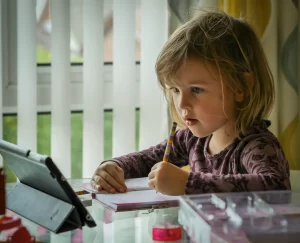By Iris Farrou
22 Aug, 2023
Childhood Health, Early Childhood Education, Fatherhood, Mental Health, New Moms, Parenting, Prevention, School, Toddler Health, Young adults & teens
abandonment, adjusting to change, Childhood Trauma, elementary school, faking sick, help my child adjust to school, high school, homesickness, how to help my child feel comfortable at school, issues, middle school, morning anxiety, morning routine, Preparing for school, preschool anxiety, school safety, separation anxiety, stomach aches before school, teachers

With Fall just around the corner, you know that back-to-school– or first-grade–season is upon us! Getting ready for the school year is always an adjustment for families, even more so if your first-born is about to join the first grade. There may be a lot of excitement, as well as nervousness, around the situation. How can you help your child, or children, and the whole family be better prepared for the school year?
Stress and Anxiety
It’s not unusual for first-graders to experience anxiety that takes the form of tummy aches or headaches, especially on Monday mornings or Sunday nights. Sometimes, you may even get a call from the school that your child is feeling unwell. These are not lies, nor are children faking discomfort in order to stay home. They are experiencing discomfort due to the anxiety of being away from home.
- Establish a morning routine that makes your family feel more connected; you can spend some extra snuggle time with your child, especially on Monday mornings, and allow enough time to have a good breakfast as a family.
- Especially in the first few weeks of school, you may want to get there early to cement the goodbye-routine: reassure your child that you are always available during the day if they need you, and remind them that they are safe. Remember that this can feel very daunting for a child, as they are spending a lot of time away from home–which they know as a safe place–and they are surrounded by new people in a new environment.
- Share your own stories from school, and bond over those memories with your child. It will make them feel much more comfortable to hear that their role model was also nervous going to school, or had the same issues as them. Sharing stories and experiences openly will not only enhance your child’s trust towards you, but it will reassure them that what they are feeling is normal.
- Be early for pickup time; your child’s separation anxiety is volatile until they fully adjust to school, and they are really looking forward to seeing you and feeling safe that they are going home. As the school day reaches its end, their expectation and nervousness heighterns: it is of immense importance that they see you waiting for them during pick up time, and are not left wondering or feeling abandoned.
Familiarity and Safe Spaces
Even if your child has attended pre-school, going to grade school is another can of worms… in addition, it is a new school and they don’t know what it looks like or what to expect. How can you help them feel secure about this change?
- Visit the school with them, walk through the campus and be present in this new space where they will be spending a lot of time without you. Trivial as it may sound, it will help your child tremendously to know what their future classroom will be like, where they will be sitting, where the restrooms are, the cafeteria, exit and pickup point, main office, etc.
- Meet the teachers if you can, as essentially they will be the “replacement” caretakers and safe people for your child while they are at school. If you can facilitate building trust and rapport with your child’s teachers before the school year begins, then your child will feel more comfortable in their expectations.
- Talk through the curriculum with your child, and explain what expectations come with grade school. It’s a new structure, so the more you can explain to them what their day will look like, what they will be doing at this new school, and what they will be doing at home as a learner, the better prepared they will be when they hear “homework” is expected to be completed.
As much as we would like to keep our children in a bubble, we all know that this is not possible. However, there is nothing more important than preparing for the school year as a family and validating your child’s anxiety–both before the school year starts and during the school year. Fingers crossed, this new school year will be filled with excitement and happiness! Remember that you and your child are a team in this, and you should always be able to reach out to the school for support if need be.
https://www.wikihow.com/Adjust-to-a-New-School
https://www.mayoclinichealthsystem.org/hometown-health/speaking-of-health/back-to-school-tips-to-help-students-adjust
https://www.ahaparenting.com/read/Help-kids-adjust-school
More
By Iris Farrou
18 Aug, 2023
Childhood Health, Early Childhood Education, Fatherhood, Lifestyle Tips, Mental Health, New Moms, Parenting, Toddler Health, Young adults & teens
Abuse, Accident, ACE, Childhood Illness, Childhood Trauma, Children, Community, Divorce, Family Dynamic, Financial Stress, Grieving, Kids, Mental Health, Neglect, Nightmares, Pediatric, Pediatric Mental Health Care, PTSD, Teenager, Toddler Trauma, Trauma, Traumatic Childhood Experiences, Violence, Witness, Witnessing

When we’re getting ready to start a new family, we may find ourselves reflecting on our own childhood experiences, and comparing with our partner how each person grew up– perhaps the goal of this introspection is to create a new family that is healthy, happy, and flourishes with good communication. If you are in the process of family planning, you may want to take into account ACEs: Adverse Childhood Experiences.
What are they?
Adverse Childhood Experiences are traumatic events children experience between the ages of 0-17. These have long lasting effects, may lead to chronic health conditions, and people address them well into adulthood. It is important to remember that ACEs affect a child’s brain, and how they experience the world.
ACEs are quite common, with 60-80% of US adults reporting they have had at least one adverse childhood experience up until age 17, and 1 in 6 US adults saying they’ve had four or more. The most potentially traumatic ACEs can include experiencing violence, abuse, or neglect in the home, neighborhood, or school, witnessing violence in the community or otherwise living in a dangerous environment (war zone, poverty stricken areas, etc.), going through a natural disaster, witnessing serious injuries or the death of another person, losing a loved one or experiencing parental loss due to separation. However, this is by no means an exhaustive list of possible ACEs: any event that may cause trauma and long-term stress can be classified as an adverse childhood experience that adversely affects a person as an adult.
How do I know if my child has had an ACE?
The effects of a traumatic or stressful event may not be immediately visible, or take place soon after the traumatic event has occurred. If your child confides something in you that would be traumatic, then that is a clear indication of an event that would warrant immediate support–with the assistance of a mental health professional who specializes in children or teenagers.
Additionally, if you are going through something as a family, such as a divorce, death, fatal accident or illness, natural disaster, poverty, community violence, unemployment, housing and/or financial insecurity, you may want to address those events as potentially traumatic for your child. We cannot always correct or control life’s adversities, but we can recognize them for what they are and present this as a starting point to healing. If you recognize, as a family, that an event has been traumatic then this shows to your child that it’s ok for things to not be “normal”–that it’s part of life, and that our reactions or daily life will change when something happens.
If there is an event or experience that you do not know about, once your child has had time to process the experience you may start noticing signs of trauma that could include, but are not limited to: difficulty sleeping or having nightmares, wetting the bed, changes to their mood, fear of other people, difficulties in school, avoiding situations, events, or people (these may be directly associated with the traumatic event), as well as difficulty showing affection towards family and friends–especially if this is a change from their usual behavior.
How can we avoid ACEs?
The unfortunate truth is that we cannot completely eliminate ACEs, as much as we may want to. What we can do, however, is raise awareness about them so that we can all start thinking differently about childhood trauma. Historically disadvantaged populations are more susceptible to trauma, but that does not mean that everyone else is excluded. The causes may be societal, historical, natural forces, or people, but each one of us can help lessen the blow of an ACE: whether you are a parent, friend, caregiver, teacher, or neighbor. Raising awareness of ACEs means switching the focus from individual responsibility to community solutions: we can all help prevent ACEs, and help children develop strong coping mechanisms. It is important to reduce the stigma associated with parents who struggle to provide a safe environment for their children, and seek community and/or government support to do so. It is also important to remember that any one of us can promote safe, stable, and nurturing environments where children are present.
https://www.cdc.gov/violenceprevention/aces/fastfact.html
https://my.clevelandclinic.org/health/symptoms/24875-adverse-childhood-experiences-ace
More


